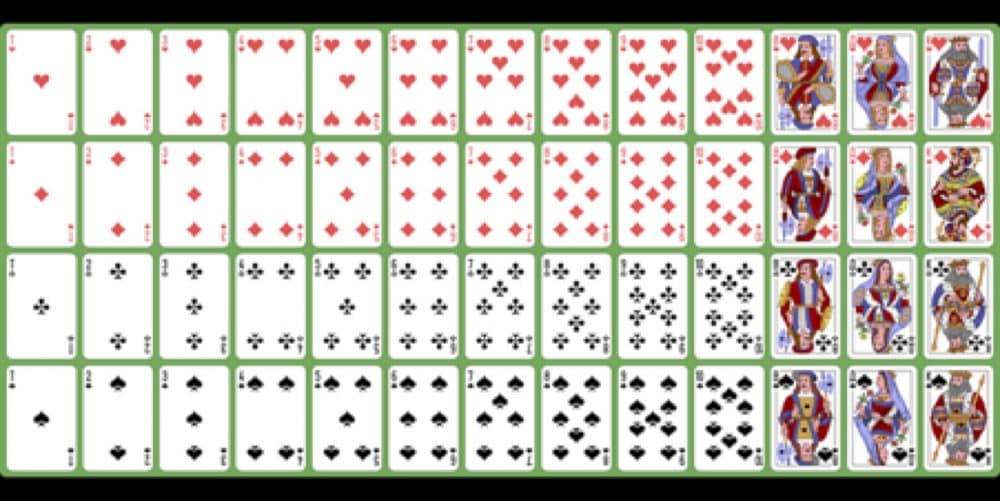We all know the old adagio about poker: it takes five minutes to learn and a lifetime to master. The same assertion holds true for many games, like blackjack and baccarat, for instance. So, how can we master so many games in a single lifetime? Unfortunately, there isn’t a one-size-fits-all answer for that.
Featured Image VIA
However, most card games do bear similarities, and understanding them can help you learn new games faster. This article will talk about the basic principles that permeate virtually every card game.
Off the Deck

The first step for learning any card game is understanding how a deck of cards work. A regular deck has 52 cards, divided into four suits, with 13 cards each. The same pack can also include a joker or two, but not every game uses it. So, let’s focus on our 52 cards.
Each suit has 13 of them, called “ranks”’, going from Ace to Ten, plus the face cards: Jack, Queen, and King. So, each pack has four Aces, 12 face cards, and 36 numbered cards. Keep this information in mind for later. There are many types of card games. Check the main ones below.
- Trick-Taking games: it’s one of the most popular kinds of card games, played by many children. Here, players lay their cards face-up, and the highest one scores the trick. Famous examples include Bridge, Spades, and Hearts.
- Exchanging games: here, players trade cards with each other and from the pile on the table. Rummy is one of the best examples of this kind of game.
- Comparing games: players compare their combination of cards to determine the winner in these games. Poker is a classic example of it.
- Solitaire games: the name is self-explanatory. Solitaire games are like, well, solitaire.
How-To
Choose a tutorial on the internet, teaching how to play your game. Do some research to find the most credible sources and stick with them. Learning the basic rules of your game is the natural first step of your journey. If you’re interested in other casino games, have a look at this guide on how to play craps for beginners.
Although there are different types of card games, as explained above, a few skills are essential to all of them.
Concentration
Concentration is the skill upon which all others must be built. It’s crucial to be absolutely in the game, catch nuances, acknowledge threats, and react accordingly. Refrain from too much talk while playing, as well as too many drinks.
Cold Blood
Every professional will tell you not to bring your heart to the table. Listen to them. Don’t let adrenaline or frustration place the chips for you. In games like poker, learning how to stand still is as important as going ballistic, and a cool head will help you discern the best moment for each one. Remaining focused can also help with it.
Card Counting
Pay close attention to the cards on the table, what cards your opponents may probably have, and what could be still in a pile. It’s called card counting, and it can be as complex as a PhD thesis on probability, but we don’t have to go that far. There are several intuitive card counting techniques, but they vary from one game to another.
More importantly, card counting isn’t about exact calculations. It’s about extrapolations and educated guesses. That’s why it’s so important to know how many cards of each kind there are in a deck of 52 cards.
Decision Making
In games like baccarat, poker, or blackjack, you’ll often have to make decisions under a lot of pressure. Needless to say, how useful this skill can be in real life. Yet, in card games, it’s a mandatory feature of any successful player. Knowing when to fold or risk it all requires all the information you could gather thus far, with your concentration and card counting skills.
Social Abilities
We’re not necessarily talking about friendliness here, but more about the empathetic exercise of reading another human being. Indeed, we aren’t always face-to-face with our opponents. Yet, we can have a fair idea of a player’s attitude and behaviour by watching how one plays. It’s possible to tell when a player is feeling bold, afraid, or reticent just by observing how they bet and how long they take to make their decisions.
Conclusion
Despite different rules and gameplays, card games mostly involve concentration and card counting. The math behind card counting techniques can get insanely complex. However, there are always simple rules to memorise and guide our choices when making fast decisions.















